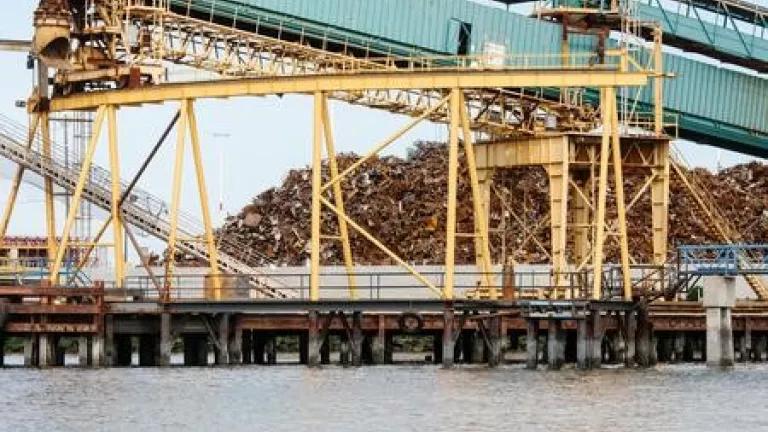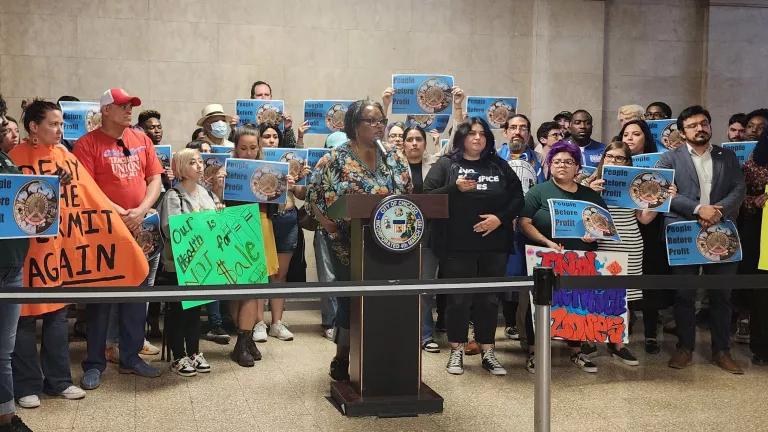One Year After Hunger Strike to Stop General Iron
This time last year, Chicago Southeast Siders vowed not to eat until the city denied a permit for General Iron. Now it’s time to deny the permit.
This time last year, Chicago Southeast Siders vowed not to eat until the city denied a permit for General Iron. Now it’s time to deny the permit.
Southeast Siders continue to fight against the notorious General Iron operation coming to our neighborhood after it was shut down in the gentrified Lincoln Park. The proposed move of the facility from the wealthy, white Lincoln Park to my working-class Latino and Black neighborhood was another glaring reminder that our city and health department are willing to let communities like mine serve as sacrifice zones for the city’s worst polluters.
For those of us that call the Southeast Side home, we are willing to go to great lengths in order to stop General Iron from moving in.
One year ago on February 4, 2021, three Southeast Siders vowed not to eat until the city denied a permit for the clout-heavy scrap shredder with a long history of pollution problems on Chicago’s North Side. What started with three hunger strikers quickly grew into a movement as more than 300 people including students, environmental groups and an alderman joined in.
By that point we had tried everything: protests, press conferences, civil rights complaints. What else did we have to lose?
Oscar Sanchez put it best: “We’re in it because we have no other choice,” he said. “This is our community, and we want to be protective of it.”
Mayor Lori Lightfoot responded saying she wanted to work with us to address our concerns, but she did not outright agree to deny the permit.
As Yesenia Chavez pointed out, “We’re literally starving ourselves to save people’s lives, and for [the mayor] to keep mentioning she wants to continue a conversation with us is dismissing how we’re putting our health at risk right now.”
Many remained committed for weeks, ending the hunger strike a month later in March 2021 with a rally near Mayor Lightfoot’s home.
While progress has been made since then, including the USEPA stepping in and successfully urging the mayor to pause the permitting process and conduct an environmental justice analysis, the permit for the facility still has not been denied.
Even putting our health on the line wasn’t enough.
The city continues to make promises of community engagement and transparency. And yes, The Chicago Department of Public Health (CDPH) has held public engagement sessions and given us the opportunity to voice our concerns, but they’ve heard all this before.
They know the findings from their health impact assessment, they know how this facility will impact our health and add to the pollution burden we already face. And they know exactly where we stand.
Calling them public engagement sessions doesn’t mean that this is true community engagement. The city is going through the motions while ignoring our concerns and outrage. After years of fighting we are still being asked what we think about the prospect of having a massive car crushing facility dumped on us.
City health officials have said that they will make a final decision soon after the last community engagement session on February 15, where officials will present an analysis of the potential environmental and health risks associated with General Iron’s current and proposed operation on the Southeast Side.
The entire permitting process lacks transparency and engagement at the most basic levels.
To fight back against polluters, I have had to become an investigator, zoning policy expert and learn about health impacts of various toxic chemicals that are released near my neighborhood’s homes, schools and parks.
Many Southeast Siders and allies stopped eating to show how dire this is to us. We never should have had to do these things to make change. Now, we’ve done all we can to make our message clear: we don’t want General Iron’s mess in our community.
So, what else does the city need to hear from us? Why do we need another Q&A? How many times will we have to repeat ourselves?
After this final meeting, we can only hope that decisionmakers will look past the profits to be gained and will remember that Southeast Siders were willing to go on a month-long hunger strike in order to stop General Iron’s permit.
This time last year many deprived themselves of food because, as Yesenia told The Guardian, “One more death because of air pollution and industrial abuse is just one too many for us to accept.” It’s time to deny the permit.




